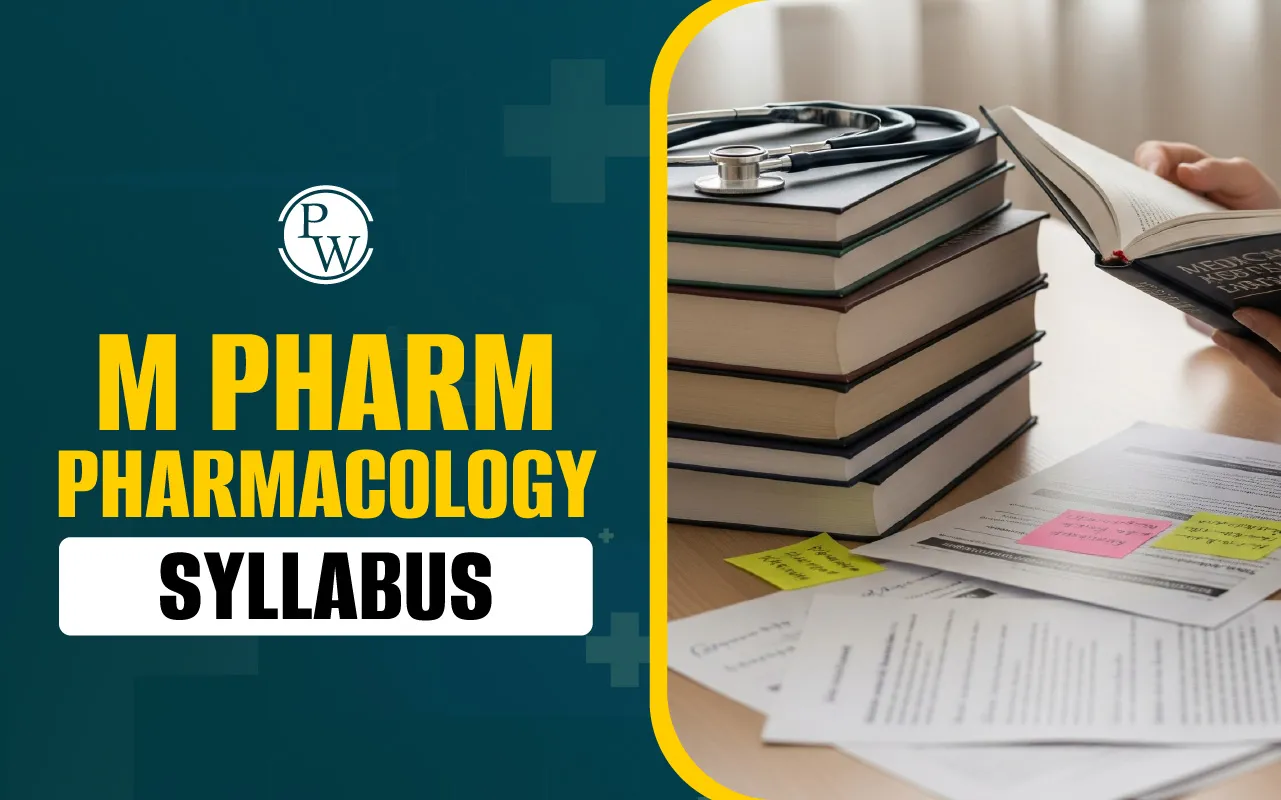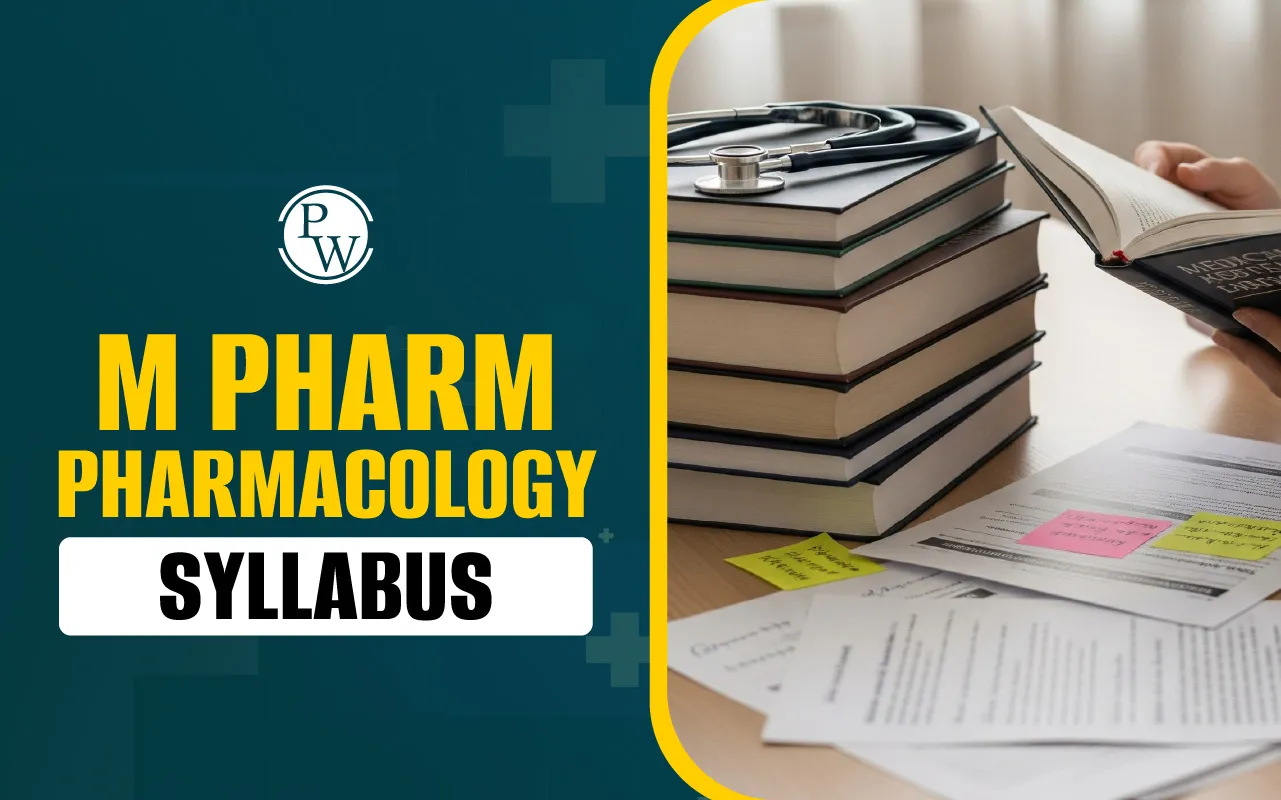

M Pharm Pharmacology Syllabus is made to give students deeper knowledge about how medicines work in the body. It also teaches different lab methods and modern research in pharmacology.
This syllabus helps students understand how drugs act at the cell level, in different organs, and in the whole body. It prepares them for work in research, hospital studies, and medicine development. Explained here is the subject list, topics for each semester, research methods, and practical work. It follows the rules of PCI and other health authorities in 2025.
M Pharm Pharmacology Syllabus Overview
M Pharm Pharmacology Syllabus focuses on both theoretical and practical aspects of pharmacology. It includes modern analytical techniques, preclinical and clinical pharmacology, molecular pharmacology, toxicology, drug discovery, and pharmacovigilance. The syllabus ensures students gain expertise in:
-
Drug mechanism at cellular and molecular levels.
-
Preclinical and clinical evaluation of drugs.
-
Use of advanced instruments like HPLC, GC, NMR, and mass spectrometry.
-
Research methods and data interpretation in pharmacology.
This curriculum also provides exposure to regulatory guidelines such as CPCSEA, OECD, ICH, and USFDA.
M Pharm Pharmacology Syllabus (Semester Wise)
Provided here is the detailed M Pharm Pharmacology Syllabus. Candidates should refer to the table for more information:
| Detailed M Pharm Pharmacology Syllabus | |||||
| Semester | Course Code & Subject | Type | Hours | Main Topics | Sub-Topics / Detailed Syllabus |
| I | MPL 101T – Modern Pharmaceutical Analytical Techniques | Theory | 60 | Spectroscopy | UV-Visible, IR, Fluorescence, Flame Emission, Atomic Absorption, NMR (1H, 13C, FT-NMR), Mass Spectrometry (MALDI, APCI, ESI) |
| Chromatography | TLC, HPTLC, HPLC, UHPLC, Column, Gel, Affinity, Ion Exchange | ||||
| Electrophoresis | Paper, Gel, Capillary, Isoelectric Focusing (IEF) | ||||
| Crystallography & Thermal | X-ray Crystallography, DSC, TGA, DTA, DDTA | ||||
| Potentiometry & Electrochemical | Potentiometry, Conductometry, Voltammetry | ||||
| I | MPL 105P – Pharmacological Practical I | Practical | 60 | Analytical & Instrumentation | UV-Vis Estimation, HPLC, GC, Fluorimetry, Flame Photometry |
| Animal Handling | Drug Administration, Blood Sampling, Anesthesia, Euthanasia | ||||
| Pharmacological Experiments | CNS, Analgesic, Anti-inflammatory, Mydriatic, Diuretic, Anti-ulcer, OGTT | ||||
| Molecular Techniques | DNA/RNA Isolation, Protein Estimation, PCR, Western Blotting | ||||
| Cellular Assays | Cell Viability, Apoptosis, Enzyme Assays, Pharmacokinetics | ||||
| I | MPL 102T – Advanced Pharmacology I | Theory | 60 | General Pharmacology | Pharmacokinetics, Pharmacodynamics, Receptors |
| Neurotransmission | Autonomic, CNS, NANC neurotransmitters | ||||
| Systemic Pharmacology | ANS, CNS, Cardiovascular, Autacoids (Histamine, Serotonin, Kinins, Prostaglandins, Opioids) | ||||
| I | MPL 103T – Pharmacological & Toxicological Screening Methods I | Theory | 60 | Animal Models | Laboratory animals, Transgenic models, CPCSEA Guidelines |
| Preclinical Screening | CNS, ANS, Respiratory, Reproductive, Analgesics, Anti-inflammatory, GI, Cardiovascular, Metabolic, Anticancer, Hepatoprotective, Immunomodulators | ||||
| Immunoassays | Digoxin, Insulin assays | ||||
| Alternate Methods | In vitro assays, Computer simulations | ||||
| I | MPL 104T – Cellular & Molecular Pharmacology | Theory | 60 | Cell Biology | Organelles, Genome, Gene Expression, Apoptosis, Necrosis, Autophagy |
| Cell Signaling | GPCR, Tyrosine Kinase, Ion Channels, Secondary Messengers, MAPK, JAK/STAT | ||||
| Genomic & Proteomic Tools | PCR, Electrophoresis, ELISA, Western Blot, Microarray, Recombinant DNA, Gene Therapy | ||||
| Pharmacogenomics | Personalized medicine, Drug response variations | ||||
| Cell Culture | Primary culture, Cell lines, Biosimilars | ||||
| II | MPL 201T – Advanced Pharmacology II | Theory | 60 | Endocrine Pharmacology | Thyroid, Hypoglycemic drugs, Corticosteroids, Contraceptives |
| Chemotherapy | Antimicrobials (Anti-bacterial, Anti-fungal, Anti-viral, Anti-TB), Anti-protozoal, Anti-helminthic, Anticancer | ||||
| Immunopharmacology | Inflammation, Asthma, COPD, Immunosuppressants & Immunostimulants | ||||
| GIT Pharmacology | Antiulcer, Prokinetics, Antiemetics, Anti-diarrheals, Chronopharmacology | ||||
| Free Radical Pharmacology | Antioxidants, Alzheimer’s, Parkinson’s, Cancer, Diabetes | ||||
| II | MPL 202T – Pharmacological & Toxicological Screening Methods II | Theory | 60 | Toxicology | Acute, Sub-acute, Chronic, Reproductive, Genotoxicity, Carcinogenicity |
| Safety Pharmacology | Tier 1 & 2 studies, IND enabling studies | ||||
| Regulatory Guidelines | OECD, ICH, EPA, Schedule Y, GLP Principles | ||||
| II | MPL 203T – Principles of Drug Discovery | Theory | 60 | Drug Discovery Process | Target Identification, Validation, Lead Optimization |
| Tools & Techniques | Genomics, Proteomics, Bioinformatics, Combinatorial Chemistry, High-Throughput Screening, Virtual Screening, Molecular Docking, QSAR, Prodrug Design | ||||
| II | MPL 204T – Clinical Research & Pharmacovigilance | Theory | 60 | Regulatory Guidelines | ICH-GCP, ICMR, Schedule Y |
| Clinical Trial Design | RCT, Non-RCT, Cohort, Case-Control, Cross-sectional | ||||
| Documentation & Monitoring | Protocol, CRF, Investigator Brochure, Safety Monitoring | ||||
| Pharmacovigilance | ADR Reporting, Tools & Software (VigiFlow, Argus, Aris G), Pharmacoepidemiology, Pharmacoeconomics | ||||
| II | MPL 205P – Pharmacological Practical II | Practical | 60 | Dose-Response & Bioassays | DRC, PA2 Estimation, Bioassays (Matching, Interpolation, Bracketing, Multi-point) |
| Isolated Organ & Animal Studies | Isolated Heart, Rat Studies (BP, ECG, Drug Absorption) | ||||
| Toxicity & Mutagenicity | Acute, Repeated Dose, Bone-Marrow Test | ||||
| Clinical & In-silico | Clinical Trial Protocol, ADR Monitoring, Docking, Pharmacophore & QSAR Studies, ADR Reporting | ||||
Semester-Wise M Pharm Pharmacology Syllabus
The semester-wise M Pharm Pharmacology syllabus is structured to gradually build knowledge from fundamental concepts to advanced research techniques. Below is a detailed breakdown:
Semester I
Here is subjectwise syllabus for Semester I:
| Subject | Topics Covered | Hours |
| Modern Pharmaceutical Analytical Techniques (MPL 101T) | UV-Visible spectroscopy, IR spectroscopy, NMR, Mass Spectrometry, Chromatography (HPLC, GC, TLC), Electrophoresis, X-ray Crystallography, Thermal Techniques, Potentiometry | 60 |
| Advanced Pharmacology I (MPL 102T) | General Pharmacology, Pharmacokinetics, Pharmacodynamics, Neurotransmission, Systemic Pharmacology (Autonomic, CNS, Cardiovascular, Autocoids) | 60 |
| Pharmacological and Toxicological Screening Methods I (MPL 103T) | Laboratory animals, Bioassays, Preclinical screening (CNS, Respiratory, Cardiovascular, Reproductive, Gastrointestinal systems), Immunoassays | 60 |
| Cellular and Molecular Pharmacology (MPL 104T) | Cell biology, Signaling pathways, Genomic and proteomic tools, Pharmacogenomics, Cell culture techniques, Biosimilars | 60 |
| Pharmacological Practical I (MPL 105P) | UV-Vis estimation, HPLC and GC experiments, Fluorimetry, Flame photometry, Animal handling and drug evaluation, DNA/RNA/protein estimation, Enzyme-based assays, Cell viability assays | 60 |
Semester II
Here is subjectwise syllabus for Semester II:
| Subject | Topics Covered | Hours |
| Advanced Pharmacology II (MPL 201T) | Endocrine pharmacology, Chemotherapy (antimicrobial, anticancer, antiviral), GIT pharmacology, Free radical pharmacology, Recent advances in Alzheimer’s, Parkinson’s, Diabetes | 60 |
| Pharmacological and Toxicological Screening Methods II (MPL 202T) | Toxicology types, OECD and ICH guidelines, Acute, sub-acute, chronic studies, Reproductive toxicology, Genotoxicity, Carcinogenicity, IND enabling studies, Safety pharmacology, Toxicokinetics | 60 |
| Principles of Drug Discovery (MPL 203T) | Drug discovery process, Target identification and validation, Lead identification, Rational drug design, Molecular docking, QSAR, Prodrug design, Role of bioinformatics, Genomics and proteomics | 60 |
| Clinical Research and Pharmacovigilance (MPL 204T) | Regulatory perspectives, Clinical trial types, Documentation, ADR detection and reporting, Pharmacovigilance methods, Pharmacoepidemiology, Safety pharmacology | 60 |
| Pharmacological Practical II (MPL 205P) | Bioassays, PA2 value estimation, Drug effects on isolated tissues and organs, Rat ECG and BP recording, Toxicity studies, Clinical trial protocols, In-silico studies, ADR reporting | 60 |
Research Methodology in Pharmacology
Research methodology is a key component of the M Pharm Pharmacology syllabus. Students learn to:
-
Design experiments and clinical trials following ethical and regulatory standards.
-
Use in vitro and in vivo models for preclinical screening.
-
Apply statistical tools for data analysis.
-
Perform in-silico docking and pharmacophore-based drug screening.
-
Evaluate ADME (absorption, distribution, metabolism, excretion) and pharmacokinetic profiles.
